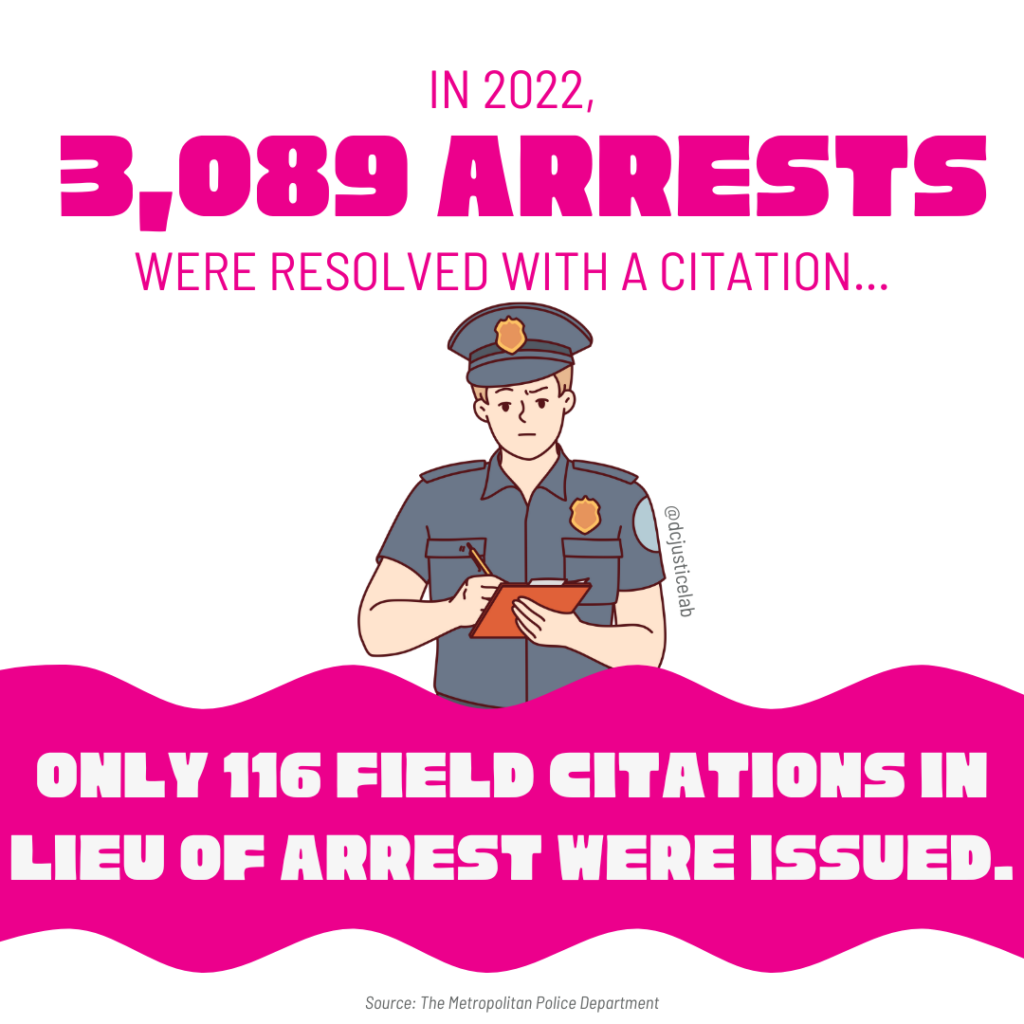citation in lieu of arrest
Unnecessary arrests make us less safe.
- 4 Minute Read
When police issue a citation instead of arresting someone, we avoid exposing someone to the harmful consequences that an arrest carries, reduce the use of pretrial detention, and can quickly redeploy policing resources. A majority of law enforcement agencies across the country have a positive view of the use of citations, and 10 states enforce a presumption that police should issue a citation instead of arrest for some or all offenses. DC has set limits on the use of citations so that only a hundred people in a given year avoid the arrest process. Communities in Colorado, Oregon and Texas were able to develop citation policies that avoided the booking process. DC should pass legislation so that more officers can resolve an encounter that avoids an arrest entirely by expanding the number of offenses that are eligible for citation in lieu of arrest, and repeal laws that require police to make an arrest.

What you need to know
When police use citations effectively, they can safely avoid custodial arrests.
When a police officer encounters someone who they suspect has committed a minor crime, they can make a custodial arrest, where that person is handcuffed, transported to a police station, booked, and held until they see a judge. In some jurisdictions, and to a limited extent in DC, a police officer can resolve an encounter by issuing a legally binding form. This form requires the individual to commit to attending their scheduled court date, and upon signing, the person is released. This avoids formal processing and functions similarly to a traffic ticket. If someone receives a citation and then fails to appear in court, they can be charged with a separate offense that can carry a fine or a sentence, and if someone skips out on a citation, the U.S. Marshals can execute a bench warrant.
Most people who receive a citation in DC are still arrested, booked, and jailed.
The majority of individuals who go through DC’s citation processes end up being arrested. While they aren’t detained overnight, they are handcuffed, processed at a police station, and subsequently released with a citation, provided they promise to appear in court. An officer can also make a field arrest, where a citation is given to someone in the community, but that person must still report to a police station within 15 days to complete the process. In 2022, 3,089 of 16,442 arrests were resolved with a citation for release after their arrest. By contrast, in 2022, police only made 116 field arrests, where the person received the citation in the community, went home, and avoided the most harmful experiences in the early parts of the criminal system.
DC law and practice narrowed who can be released or avoid an arrest through citation.
In March 2020, the DC Superior Court issued an emergency order encouraging the MPD to make much broader use of citation in lieu of release by making more offenses eligible for release after arrest, and not automatically excluding people who had a prior arrest or conviction. That order was rescinded in 2022. DC law substantially restricts MPD’s ability to make “field arrests” for low-level offenses. Police are authorized to make field arrests only for misdemeanors prosecuted by the DC Office of Attorney General; it excludes offenses prosecuted by the U.S. Attorney’s Office.
Ten states require a citation instead of arrest, and twenty-six states allow it.
The DC Code Reform Commission looked at information that showed other states’ made use of citation in lieu of arrest. Twenty-six states explicitly allow police to issue a citation instead of arrest for some or all offenses. Ten states – including red states like Louisiana, Kentucky, and Nebraska – enforce a presumption that officers will use a citation instead of an arrest for certain offenses. Unlike DC, places like Denver, Colorado, Portland, Oregon, and San Marcos, Texas were able to develop citation policies that avoided the booking process altogether.
Increasing the use of citations will save taxpayers money.
Issuing a citation instead of arresting, booking, and jailing someone reduces public spending, including reductions to the policing and jail budget. While there is no audit of the costs of deploying police in DC, studies elsewhere have shown that issuing citations instead of making arrests offers significant cost savings because the process is much shorter. Four places in North Carolina seeking to develop a model citation release policy found a citation takes 28 minutes to resolve, while a custodial arrest takes 171 minutes – a difference of more than two hours. If you applied the North Carolina figures to an conservative estimate of what police make over a year per hour – not including overtime and benefits– DC would save $80 on the $100 it spends per arrest if citations were used to resolve the contact.
The narrow use of citations reduces safety – increasing use would bolster safety.
An arrest that could have been avoided reduces safety. Research shows that being arrested makes people prone to reduced income, more likely to drop out of school, and more likely to experience trauma and mental health challenges. If the arrest leads to pretrial detention, even one day in jail increases the likelihood of being arrested again. By contrast, studies of young people given a citation instead of being arrested have lower recidivism rates. Increased use of citations also increases opportunities for police to de-escalate an encounter, potentially leading to fewer use-of-force incidents and improved relations with the community. An arrest that could have been avoided reduces safety. Research shows that being arrested makes people prone to reduced income, more likely to drop out of school, and more likely to experience trauma and mental health challenges. If the arrest leads to pretrial detention, even one day in jail increases the likelihood of being arrested again. By contrast, studies of young people given a citation instead of being arrested have lower recidivism rates. Increased use of citations also increases opportunities for police to de-escalate an encounter, potentially leading to fewer use-of-force incidents and improved relations with the community. A study that looked at the impact of the citation in lieu of release policy used through 2022 found, “our fndings suggest that the Washington, DC, MPD was able to implement the citation release program—reducing the jail population and transmission of COVID-19—without exacerbating crime.“
WHERE TO LEARN MORE
Criminology and Public Policy January 2024
DC Justice Lab Report January 2021
Florida Department of Juvenile Justice 2021
International Association of Chiefs of Police April 2016
Safety and Justice Challenge 2022
University of North Carolina July 2021
Our Solutions
DC Should:
- Pass legislation to require police officers to issue a field citation unless an arrest is immediately necessary
- Provide more training to police on the value of field citations
- Study and evaluate how officers are using field citations
- Reinstate the citation policy that led to more releases after an arrest
- Repeal laws that require police to make an arrest
Contact us about this topic
special thanks
Brooke Pemberton ★ Samantha Piszcz



